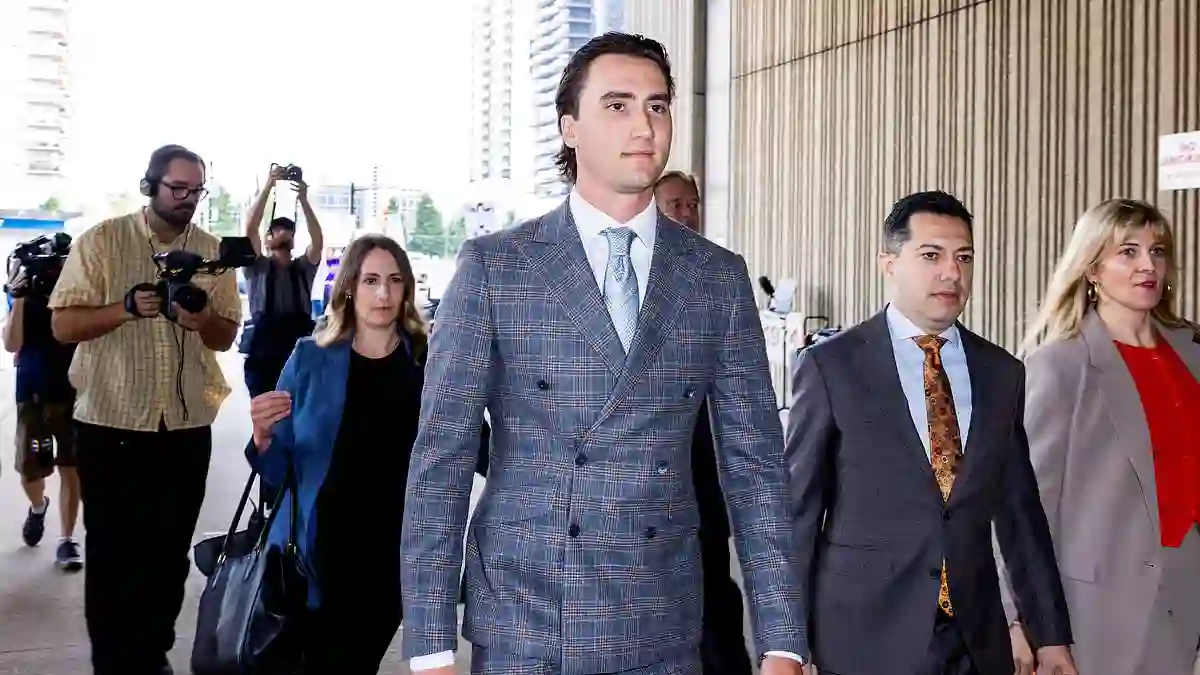After nearly seven years of public scrutiny, courtroom drama, and intense legal debate, all five former Hockey Canada players accused of sexual assault have been acquitted.
The case, which had become one of the most high-profile sexual assault trials in Canadian sports history, ended Thursday with an Ontario judge ruling there wasn’t enough reliable evidence to convict any of the accused.
Judge Cites Lack of Credible Evidence
Ontario Superior Court Justice Maria Carroccia delivered the verdict, stating clearly that the prosecution failed to meet the legal burden of proof.
She told the courtroom she did not find the complainant’s evidence “credible or reliable,” a statement that drew audible gasps and tears from some in attendance.
The players—Michael McLeod, Carter Hart, Cal Foote, Dillon Dube, and Alex Formenton—were told they were “free to go.”
McLeod, who had faced an additional charge of being a party to the offense, was also acquitted on that count.
Consent Was Central—But Not Legally Complicated, Judge Says
A major theme in the case was consent. Justice Carroccia acknowledged that while the public may be re-examining what consent means, this particular case didn’t challenge the legal definition.
“This case, on its facts, does not raise issues of the reformulation of the legal concept of consent,” she said.
“I have found actual consent not vitiated by fear.”
In simpler terms: she believed that the complainant did consent—and that the Crown could not prove otherwise beyond a reasonable doubt.
The Allegation: A Night in 2018 That Changed Everything
The accusation dates back to June 19, 2018. The woman at the center of the case, known only as E.M., testified in May that she was drunk, naked, and afraid when four of the players entered her hotel room at the Delta London Armouries unexpectedly.
She said she felt her only “safe” option was to comply with what they wanted.
“I made the choice to dance with them and drink at the bar,” she said on the stand. “I did not make the choice to have them do what they did back at the hotel.”
Prosecutors argued the men engaged in sexual acts without properly ensuring she gave her voluntary and enthusiastic consent.
Defense attorneys countered that E.M. had been a willing participant, even suggesting she had initiated parts of the encounter.
Legal History and a Case Reopened
Although the incident was first reported to police in 2018, the original investigation wrapped up a year later with no charges.
It wasn’t until a civil lawsuit filed in 2022—seeking $3.55 million—that things changed.
That suit was eventually dropped after a settlement was reached between E.M. and Hockey Canada.
However, that agreement triggered public outrage and renewed police interest.
London Police reopened the case, and by early 2024, charges were laid against the five former players.
It later emerged that Hockey Canada had operated two secret funds to settle sexual assault claims, further fueling the controversy.
NHL Response and Where the Players Stand Now
The NHL also launched its own investigation back in 2022.
League Commissioner Gary Bettman has said the findings would be released “if legally possible,” though no timeline has been given.
As for the players themselves, none of the five are currently signed with an NHL team.
Carter Hart was once the Flyers’ starting goalie, while McLeod and Dube had regular roles with the Devils and Flames, respectively.
Foote had been in the AHL, and Formenton had taken his career to Europe, playing for Swiss club HC Ambri-Piotta.
What Comes Next?
Although the criminal trial is now over, the aftermath of this case will likely linger for years.
The verdict won’t erase the public debate over how institutions like Hockey Canada handle allegations of abuse—or how consent is discussed in cases involving power, alcohol, and reputation.
While the legal chapter may be closed, the cultural and institutional reckoning for Canadian hockey is far from over.
